De Christiana expeditione apud Sinas suscepta ab Societate Jesu

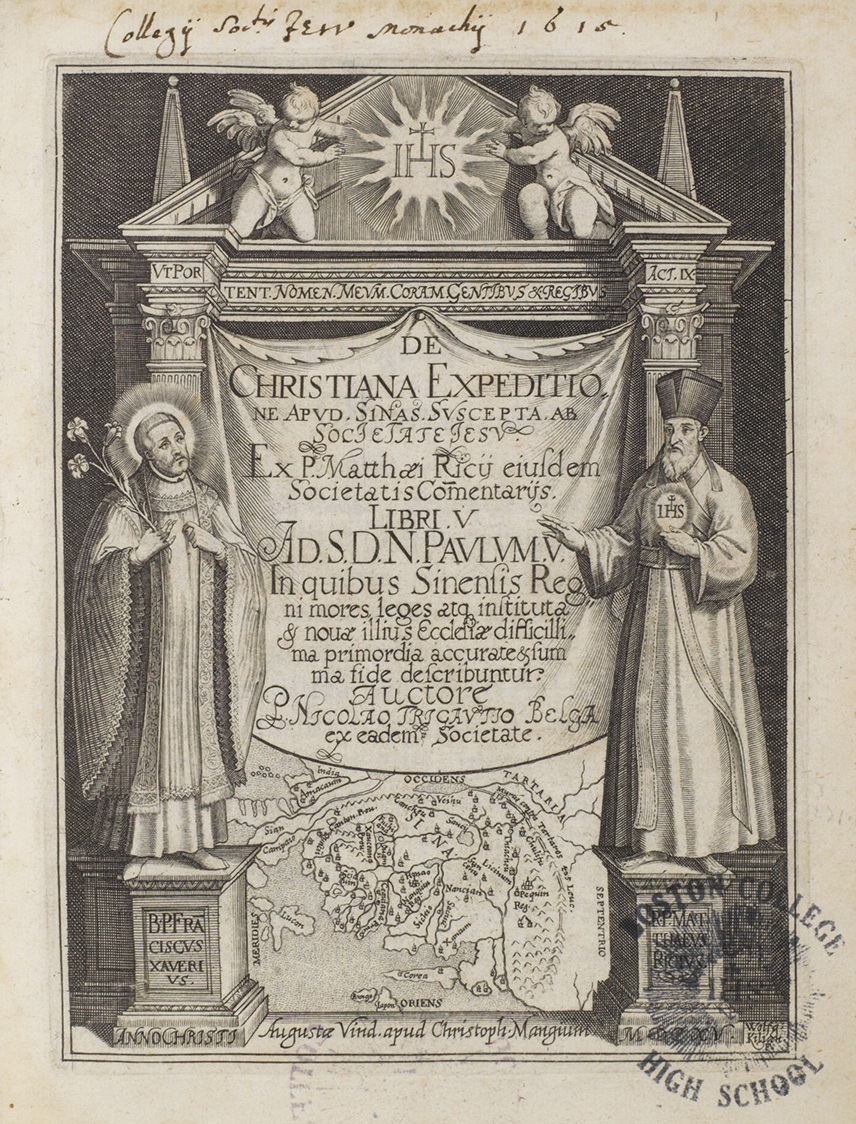
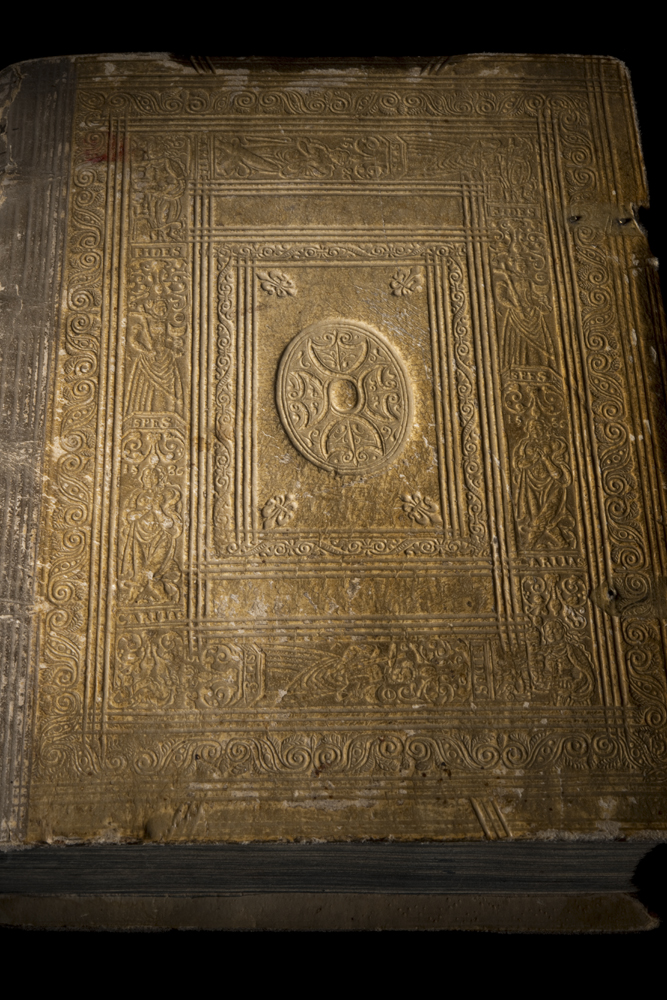
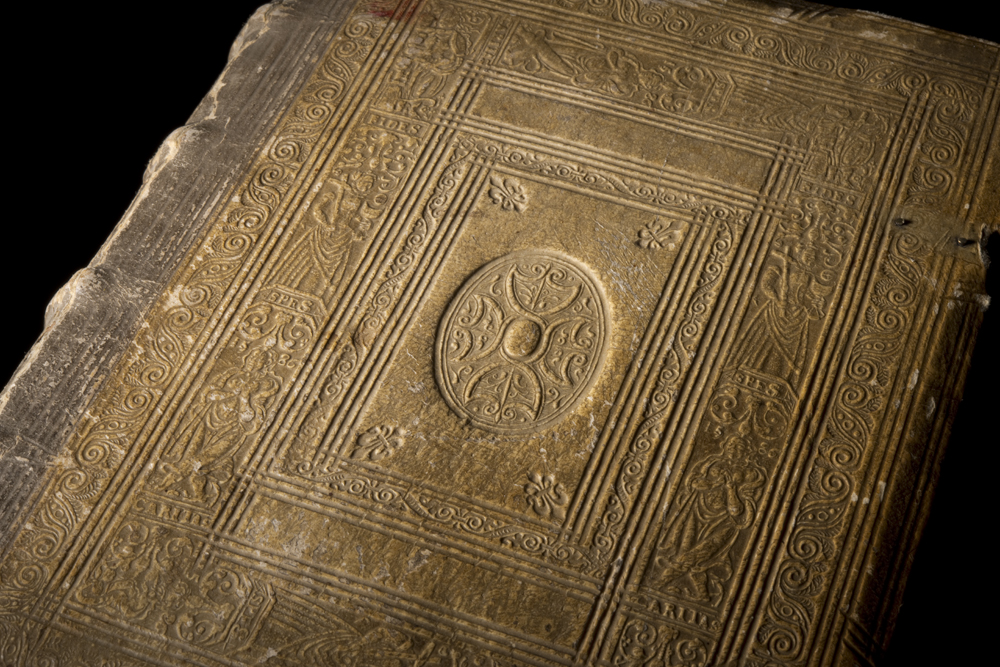
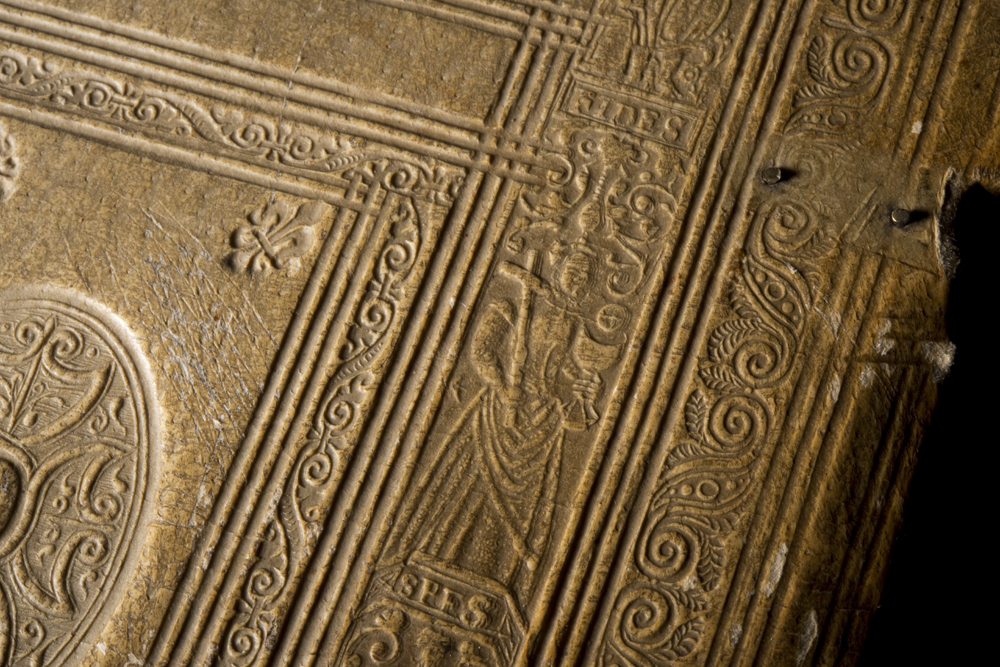
The full title of this significant work is
De Christiana expeditione apvd Sinas svscepta ab Societate Jesv / ex P. Matthæi Ricij eiusdem Societatis com[m]entarijs. Libri V ad S.D.N. Pavlvm V in quibus Sinensis Regni mores, leges atq. instituta & novæ illius Ecclesiæ difficillima primordia accurate & summa fide describuntur / auctore P. Nicolao Trigavtio Belga, ex eadem Societate.
That is:
Concerning the Christian expedition to China undertaken by the Society of Jesus, from the journals of Fr. Matteo Ricci of the same Society. Five books dedicated to our holy Lord Paul V in which the customs, laws, and principles of the Chinese kingdom and the most difficult first beginnings of the new Church there are described accurately and with great fidelity / authored by Fr. Nicolas Trigault, Belgian, of the same Society.
It was printed in Augsburg, southern Germany, in 1615 by Christopher Mangius.
The journals of Matteo Ricci revealed China to Europe in a way not done since the work of Marco Polo almost three centuries earlier. Unlike Polo’s writings, however, these journals were regarded as believable from their very first appearance. Indeed the salutation to the readers at the beginning of the work was certainly at pains to distinguish its contents from other books. It noted that “Up to the present there are two kinds of authors who have written about China; those who have imagined much and those who have heard much and have published the same without due consideration.”
The work was to be something different altogether. It was presented not only as an accurate account of the customs and culture of this famed land (based on lengthy first-hand experience) but also as a factual reporting of the progress of Christianity since the time of the Jesuits’ entry to China in the late sixteenth century. Thus, in addition to writing about the slow pace of conversions and the struggles associated with cross-cultural exchange, the journals also extensively described the myriad things that had caught the missionaries’ attention.
For example, the Jesuits were struck by the use of the rivers and crisscrossed waterways. “In my opinion it might be said with greater truth and without fear of exaggeration, that there are as many boats in this kingdom as can be counted up in all the rest of the world.” They were amazed at the use of gunpowder: “… one year when I was in Nanjing [1599] I estimated that in the month-long New Year celebrations they used up more saltpeter and gunpowder than we would need for a war lasting two or three years.” And they also noticed the ubiquitous use of a drink called ‘cia’ (that is, tea). “This beverage is sipped rather than drunk and it is always taken hot. It is not unpleasant to the taste, being somewhat bitter, and it is usually considered to be wholesome even if taken frequently.”
These accounts, and more, so fascinated the European readership that within ten years Ricci’s journals had been translated again and printed in French, Italian, Spanish and German editions. A further four Latin editions appeared and selections from the journals also featured in English in the famous Purchas his Pilgrim. The work therefore was a great success and a landmark in the history of reportage about China.
This website therefore makes the work available to a general readership that wishes to read about China in the sixteenth century, as well as to scholars who want access to the primary source.
Two final, further, comments can be made about the work: one about the question of authorship and one about the manner in which it came to be dedicated to Pope Paul V.
As the title of the book states clearly, the Jesuit procurator Nicolas Trigault (1577-1628) was more than just an editor behind the scenes. Rather, he was critically involved in the work, not only in terms of getting it to a printer but also in terms of transforming Ricci’s unfinished journals into the ‘finished’ product. Ricci had been working on his journals, or commentaries, for some years before his death and the almost finished manuscript was mostly written in Italian. Trigault was responsible for translating the original into Latin, the language of common European scholarship, which he started during his journey back to Europe, and finished after his arrival in Rome at the end of 1614. (He had left Macau in 1612).
During the course of Trigault’s scholarship he chose to delete, or alter, texts that might bring discredit to the work of the Jesuits in China and made additions and changes to the prose to construct a better narrative. Thus, given the changes he had made, he was correct to sign himself as the ‘author’. (It was not until the twentieth century that Ricci’s original Italian text saw the light of day). Furthermore, given that Trigault had also been commissioned to bring support to the China mission in any way he could it made sense to publicize his own role (his ‘authorship’) in the publication. This was because by the time of the first edition and certainly by the time of later editions and translations, Trigault had become a well-known figure in Europe and thus his fame brought further fame to the journals.
One of Trigault’s many commissions as procurator was to gain the support of the pope in a number of ways, including gaining financial support, convincing the pontiff to make some ecclesiological concessions to the young Chinese church (as for instance allowing liturgy in the vernacular and considering the appointment of a bishop for China) and donating academic books to assist the intellectual mission of the Jesuits. Dedicating the book to ‘our Holy Lord Paul V’ was thus one way of enticing the pope to support these goals, if he did not choose to support them based on their merit alone. In this, as with his other commissions, Trigault was remarkably successful. He not only received financial support, he collected a significant library to take back with him to China, he gained permission for the Catholic Mass to be celebrated in Chinese (which, sadly, did not come to pass once he returned) and the dedication of the book to the pope also added to its own stature.
Ricci’s journals were thus both a means of historical communication and a tool to garner further support for the China mission.
How to Use the Online Books
A help page explaining the difference between the book readers and how to use the scholarly search.
Related Items
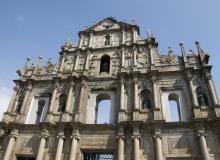
In 1557 Portugal established a settlement in Macau; it became an important gateway into China, for Jesuits and for traders.
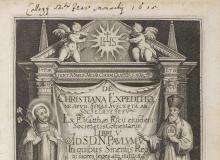
The life of Jesuit missionary Matteo Ricci (1552-1610) has continued to attract academic interest. He was greatly helped by his Chinese friends.
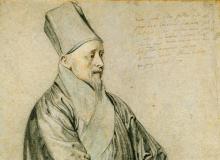
The Jesuit who returned to Europe to promote the work in China was the ‘procurator.’ Nicolas Trigault (1577-1628) was highly successful as this.
